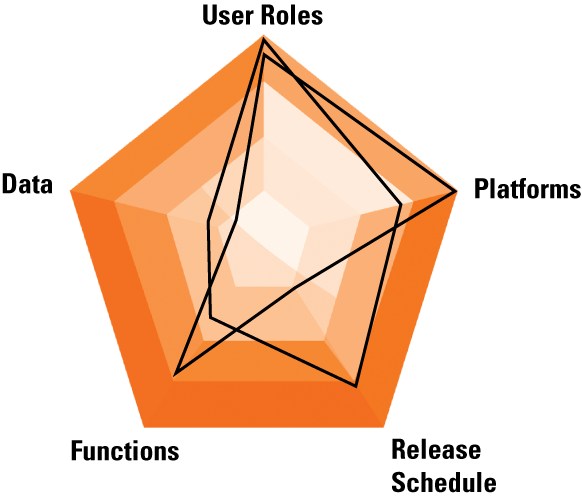Test Automation Assessment
Test Automation Assessment and Implementation
For those in startups or small companies with a simple or single product, an ad hoc QA process with manual functional testing and regression testing probably works just fine (for the time being). Even for some large corporations or ISV’s, automation testing may be kept on the backburner indefinitely. However, as a business grows, software development of more products for customers, and/or the expansion of features and functions within the existing products, grows. At some point, the importance of delivering high-quality software and the need for incorporating automation within QA becomes today’s to-do item!
It can be challenging to kick start a software test automation program. Oftentimes, companies start by choosing an automated software testing tool without first thinking about an automated testing strategy and how it fits into the organization AND their software development and QA process. Automated software testing can often be expensive and difficult, especially given the array of tools and the expertise needed to master them. Any automated testing program will require some level of upfront investment in time, resources, and effort. So when is the appropriate time to start automated testing?
XBOSoft’s Automation Assessment
A successful automated QA testing program begins with a firm baseline understanding of test automation. XBOSoft’s cost-effective software test automation assessment and implementation program will take you from 100% manual regression QA to the “right” balance of automation and manual testing in as little as 4-6 weeks.
At XBOSoft we utilize a straightforward 4-step process:
- Step 1 – We believe you can’t automate what you don’t understand, so our initial objective is to examine the client’s software and understand its workings and functionality. XBOSoft deliverable – Client Test Automation Objectives Document
- Step 2 – Determine a set of test automation tool candidates suitable for the client’s software. If the client has existing tools combined with a strategy and reasoning for why these tools are best suited given their context, this step is skipped. XBOSoft deliverable – Automation Tool Feasibility Report.
- Step 3 – Determine the test automation strategy to identify where the software can effectively benefit from test automation, followed by test architecture and design. XBOSoft deliverables – Test Automation Strategy Document; Automation Test Case Design and Parameterization Guidelines, Software Test Automation Architecture, and Automation Framework Design Guidelines.
- Step 4 –Create an executable automation script using the test automation tool from Step 2 with written instructions on how to set up the test environment, deploy and execute the script.
Depending upon the client’s needs, XBOSoft often supplements the above with guidelines on how to maintain and extend the automation test scripts and incorporating best practices in the analysis of test results. This provides the basis for a good long-term test strategy.
Not Quite Ready for an Automation Assessment?
The three resources below can be a good start for those in the early stages of software automation research:
Automated Software Testing Basic Guidelines – This white paper shows you how to get started, and covers areas such as:
- How to select the right automated software testing tools depending on YOUR criteria and test strategy;
- Practical lessons and step-by-step procedures for building a framework and Software Test Automation Architecture;
- Coding tips; interfacing with Unit testing, and Rules to follow for easy maintenance of automation scripts. It also points out typical areas that are prone to failure, and how to avoid them.
Automated Software Testing Best Practices – Our best practices change according to changes in technologies, methods, and business requirements. Additionally, Best Practices for some are not Best for others. In any case, we’ve listed out some Great Practices so that you can pick and choose which ones are BEST for you. This can even be useful for the software development team!
Automated Test Assessment White Paper – This document discusses the factors involved in deciding whether automate software testing is right for you and then provides a step by step self-assessment to help you objectively decide whether or not to go forward with it.
Although not specifically addressed within our typical Automation Assessment; Automated Performance Testing is also an important part of test automation that should take place on a regular basis to ensure that your application performance does not degrade over time as new features and functions are added.
XBOSoft’s Awards and Recognitions
Some Key Benefits of Automated Software Testing
- Save time– Significant time savings can be realized through automation; in some cases up to 70%. Not every test case is automatable, however. Frequent regression cycles and manual test cases that are repetitive or require tedious input of test data are situations where automation may make sense.
- Improve test coverage– Create automated software testing scripts that cover more than you can do manually and that provide clear results so that you can increase platform coverage by 55% in the same testing cycle. That’s what our clients have done, why leave critical platforms uncovered when you can achieve coverage through automation.
- Increase ad-hoc and exploratory testing– With resources freed up by automated software testing tools, testers can do what they do best. Find – critical defects leveraging your skilled QA resources in the right place at the right time.
- Reduce cost and maintenance –Use our minimal-maintenance automation testing services, infrastructure with a centralized repository, and modular test automation framework so that changes can be done once and propagated throughout. Our proven frameworks have saved our clients an average of 38% in automation re-work time and costs.
XBOSoft has been providing professional automated software testing services for over 13 years. In the world of automation testing, we’ve seen a thing or two; from publishing topical Automation White Papers, presenting at conferences, and holding Automation workshops, to providing day-in and day-out automation test services to clients globally. When and Where to automate, How to automate, and What tools to use to automate can be challenging issues.




